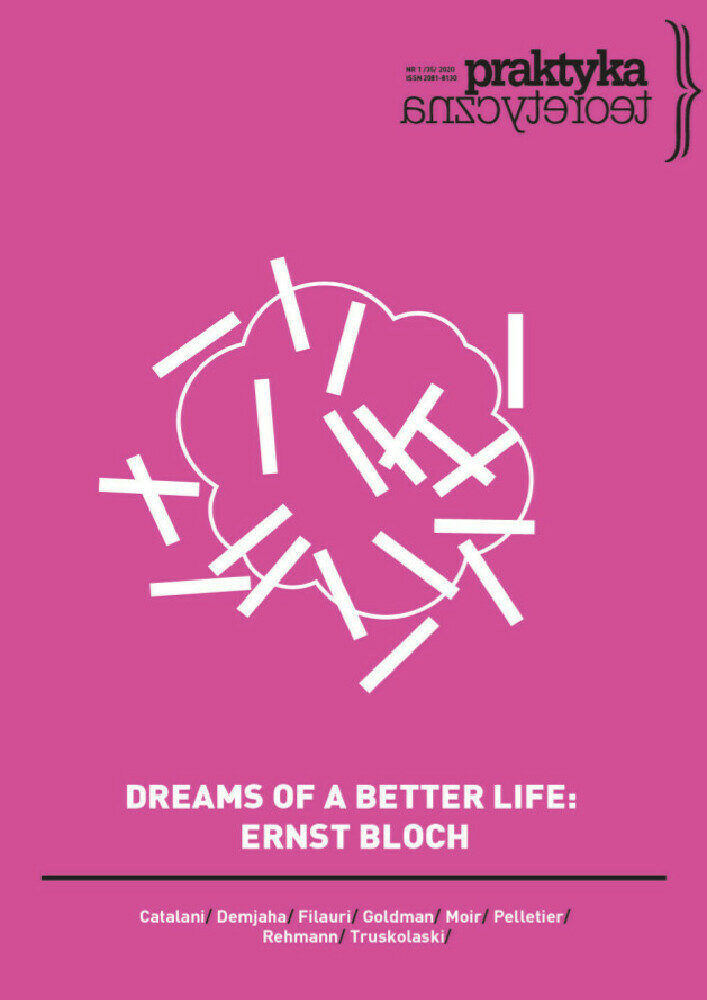Abstrakt
During a radio debate in 1964, Bloch and Adorno clashed over the status of Utopia in Marx’s thinking. In particular, the disagreement concerned the possibilities (or, rather, limitations) of picturing – with Marx and beyond Marx – a condition in which all societal antagonisms have been reconciled. It is telling, then, that their conversation quickly came to turn on a surprising term: the Old Testament interdiction against making images of God. Given both authors’ commitment to an ostensibly secular critique of capitalist modernity, the prominence of this figure, which is emblematic of the decades-long exchange between these authors, invites further questions. What, for instance, are the epistemic and aesthetic conditions under which Bloch and Adorno propose to present their Marxian Utopias? By considering these questions in light of issues arising from their debate, and applying it to their writings more generally, my
paper aims to contribute to the on-going exploration of “Utopia” in German Critical Theory.
Bibliografia
Adorno, Theodor W. 1992. Notes to Literature, Vol. 2. Translated by Shierry Weber Nicholsen. New York: Columbia University Press.
Adorno, Theodor W. 1973. Negative Dialectics. Translated by E.B. Ashton. London: Routledge.
Adorno, Theodor W. and Bloch, Ernst. 1988. “Something’s Missing: A Discussion between Ernst Bloch and Theodor W. Adorno on the Contradictions of Utopian Longing (1964).” In The Utopian Function of Art and Literature. Translated by Jack Zipes and Frank Mecklenburg, 1–17. Cambridge, MA: MIT Press.
Bastani, Aron. 2019. Fully Automated Luxury Communism: A Manifesto. London: Verso.
Benjamin, Walter. 1999. “On the Mimetic Faculty.” In Selected Writings 2.2, 1931-1934, edited by Howard Eiland, Michael W. Jennings and Gary Smith, 720–722.
Cambridge, MA: The Belknap Press of Harvard University Press.
Benjamin, Walter. Origin of the German Trauerspiel. Translated by Howard Eiland. Harvard, MA: Harvard University Press Bloch, Ernst. 1995. The Principle of Hope, Vol. 1. Translated by Neville Plaice, Stephen Plaice, and Paul Knight. Cambridge, MA: MIT Press.
Benjamin, Walter. The Spirit of Utopia. Translated by Anthony A. Nassar. Stanford, CA: Stanford University Press.
Benjamin, Walter. 2006. Traces. Translated by Anthony A. Nassar. Stanford: Stanford University Press.
Cohen, Hermann. 1995. Religion of Reason Out of the Sources of Judaism. Translated by Simon Kaplan. Oxford: Oxford University Press.
Elbe, Ingo. 2013. “Between Marx, Marxism and Marxisms – Ways of Reading Marx’s Theory”. Viewpoint Magazine. Last altered October 2013. https://viewpointmag.com/2013/10/21/between-marxmarxism-andmarxisms-ways-of-reading-marxs-theory/#rf43-2941.
Engels, Friedrich. 1989. “Socialism: Utopian and Scientific.” In Marx & Engels Collected Works, Vol. 24: 1874-1883, 281–325. London: Lawrence & Wishart.
Geuss, Raymond. 2019. “A Republic of Discussion: Habermas at Ninety.”, The Point Mag. Accessed 19 January 2020. https://thepointmag.com/politics/a-republic-of-discussion-habermas-at-ninety/.
Hegel, G.W.F. 1975. Aesthetics: Lectures on Fine Arts. Translated by T.M. Knox. Oxford: Clarendon Press.
Honneth, Axel. 2009. Pathologies of Reason: On the Legacy of Critical Theory. Translated by James Ingram et al. New York: Columbia University Press.
Horkheimer, Max. 1970. “Was wir Sinn nennen wird verschwinden – Spiegel Gespräch mit dem Philosophen Max Horkheimer.” Der Spiegel, 5 January 1970: 79–84.
Kant, Immanuel. 2000. Critique of the Power of Judgement. Edited by Paul Guyer. Translated by Paul Guyer and Eric Matthews. Cambridge: Cambridge University Press.
Levitas, Ruth. 1990. The Concept of Utopia. Ithaca, NY: Syracuse University Press.
Löwy, Michael. 1981. “Marxism and Revolutionary Romanticism.” Telos, No. 49: 83–95.
Lukács, Georg. 1988. Theory of the Novel: A Historico-Philosophical Essay on the Forms of Great Epic Literature. Translated by Anna Bostock. London: Merlin Press.
Marx, Karl. 1975. “Letters from Deutsch-Französischer Jahrbücher.” In Marx & Engels Collected Works, Vol. 3: 1843-1844, 141–145. London: Lawrence & Wishart.
Marx, Karl and Engels, Friedrich. 1976. “The Manifesto of the Communist Party.” In Marx & Engels Collected Works, Vol. 6: 1845-1848, 477–506. London: Lawrence & Wishart.
Marx, Karl and Engels, Friedrich. 1996. Marx & Engels Collected Works, Vol. 35: Capital, Vol. 1. London: Lawrence & Wishart.
Mason, Paul. 2016. Postcapitalism: A Guide to Our Future. London: Penguin.
Schmid-Noerr, Gunzelin. 2001. “Bloch und Adorno – bildhafte undbilderlose Utopie.” Zeitschrift für kritische Th : 25–56.
Truskolaski, Sebastian. 2017. “Inverse Theology: Adorno, Benjamin, Kafka.” German Life and Letters, Vol. 70, No. 2 (April): 192–210.
Weber, Samuel. 2010. Benjamin’s -Abilities. Cambridge, MA: Harvard University Press.
Licencja
Autorzy:
„Praktyka Teoretyczna” jest pismem, które chce realizować idee wolnego dostępu do wiedzy i poszerzania domeny dobra wspólnego. Ma służyć rozwojowi nauki i krytycznej refleksji w Polsce i na świecie w imię idei wolnego dostępu do wiedzy (Open Access). Całe pismo jest udostępniane za darmo w Internecie na warunkach licencji CC-BY-NC-SA (Uznanie autorstwa-Użycie niekomercyjne-Na tych samych warunkach 4.0 Międzynarodowe) w wersji 4.0 (szczegółowe warunki: http://creativecommons.org/licenses/by-nc-sa/4.0/). Artykuły w nim zamieszczone mogą być dowolnie przechowywane, kopiowane, drukowane, rozpowszechniane i wykorzystywane do celów naukowo-dydaktycznych przy zachowaniu warunków licencji. Apelujemy tylko o uznanie autorstwa i podanie źródła w myśl przyjętych w środowisku naukowym standardów.
Nie ma natomiast możliwości komercyjnego wykorzystania zgromadzonych zasobów bez pisemnej zgody wydawcy. Dostęp do czasopisma nie może być dystrybuowany za opłatą czy w jakikolwiek inny sposób limitowany przez inne podmioty.
Autorzy tekstów przyjętych do publikacji w czasopiśmie „Praktyka Teoretyczna” są zobowiązani do wypełnienia, podpisania i odesłania na adres redakcji umowy o udzielenie nieodpłatnej licencji do utworów, z zobowiązaniem do udzielania sublicencji CC [PL.pdf, PL.doc, EN.pdf, EN.doc].
Zgodnie z umową, autorzy tekstów opublikowanych w czasopiśmie „Praktyka Teoretyczna” udzielają wydawcy czasopisma niewyłącznej i nieodpłatnej licencji oraz zezwalają na użycie sublicencji Creative Commons Uznanie autorstwa-Użycie niekomercyjne-Na tych samych warunkach 4.0 Międzynarodowe (CC-BY-NC-SA 4.0).
Autorzy zachowują prawa do dalszego, swobodnego rozporządzania utworem.
Autorzy nadsyłanych artykułów powinni upewnić się, czy wykorzystywane przez nich materiały nie są chronione prawami autorskimi na rzecz innych osób i ponoszą odpowiedzialność za ewentualne uchybienia w tym względzie.
